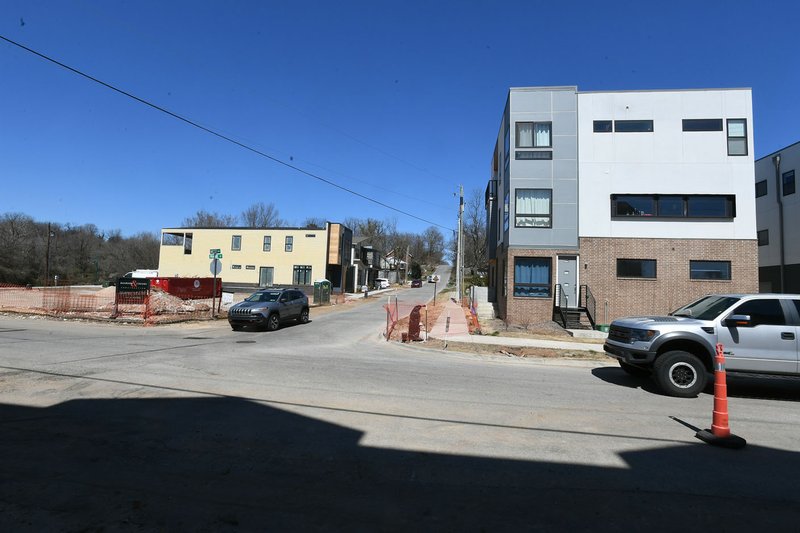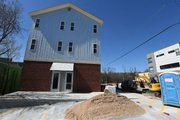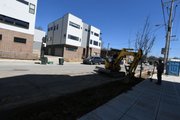Demand for homes continues to outpace supply and push up prices and rents in Northwest Arkansas, real estate agents and analysts say.
In the second half of last year Benton and Washington counties had enough empty residential lots ready for houses to last a little more than two years at the pace they're snapped up, Arvest Bank and the University of Arkansas Center for Business and Economic Research said in the Skyline Report released last month.
Home price
The average sales price of purchasing a home in the last six months each year
Year^Benton County^Washington County
2014^$203,419^$178,774
2015^$206,575^189,093
2016^$221,944^$201,804
2017^$228,310^$219,876
Source: Skyline Report
By the Numbers
Residential real estate results for the last six months of 2017 in Benton and Washington counties
27.3 months Supply of remaining lots in active subdivisions (down 53.5% since 2014)
1,434 building permits issued (down 12.5% since 2016)
5,571 empty lots in active subdivisions (down 36.7% since 2014)
1,030 homes under construction (up 53.7% since 2014)
Source: Skyline Report
It's the lowest supply since at least 2004 and half of what it was in 2014, putting a limit on home construction in the near term. The shortage and construction costs have pushed average home prices upward, the report found, adding $30,000 to $40,000 since 2014 to an average price of $220,000.
The region's homeowners meanwhile are also buying up the supply of existing homes at a faster pace than a year ago, according to reports from real estate firm Coldwell Banker Harris McHaney & Faucette.
The trends could make housing less affordable for lower-income households, a problem the university, the Walton Family Foundation and several homeless service providers and other nonprofits are trying to address. Adam Steenken, an agent with Coldwell Banker, said the market's fast pace can affect buyers and renters in several ways.
For instance, some investors looking to buy houses for rental property will buy them sight unseen, elbowing out people wanting to buy their first house, he said. Rents in desirable areas, like downtown Fayetteville, can be hundreds of dollars higher than the home's mortgage payment would be.
Steenken said the same pattern can dissuade owners from selling their homes when they can get more for it as a rental, further tightening the supply.
"Having a hot market is nice," he conceded, but "it'd be advantageous for everybody if there was more available."
Potential homebuyers sometimes want to sleep on a decision before they buy a house, but he warns them someone else has already slept on it.
"The next day, the house is gone," he said.
Essentially what was a glut of residential lots during the Great Recession has been used up, said Philip Taldo, real estate broker and co-owner of Weichert Realtors-The Griffin Co.
The shortage of lots has uneven effects around the region, according to the twice-yearly Skyline Report. Building permits for new housing construction are still concentrated in the biggest cities, but they dropped significantly from the second half of 2016 to the second half in 2017 in Fayetteville, Rogers and Bentonville.
Those three cities have some of the area's highest average cost per square foot at $120, according to Realtor.com early this month. Cities such as Springdale and Farmington issued more permits and had prices near $100 a square foot, which can mean an overall price tens of thousands of dollars lower.
Smaller cities can offer lower prices, though they're farther from many jobs and attractions. And some of them are running out of lots that have the infrastructure and city approval for construction. Prairie Grove Mayor Sonny Hudson said he expects those lots to run out by the end of the year. Developers as a result are buying pastureland and venturing beyond city limits.
"We have plenty of space, we are just running out of these lots that are already there," Hudson said. Homebuyers are coming from elsewhere in Northwest Arkansas or as far as New York, he added, pointing to the city's historic district, Prairie Grove Battlefield State Park and other amenities.
"We just love where we live," he said.
Growing outward means more infrastructure costs for cities and higher transportation costs for residents, said Mervin Jebaraj, director of the economic research center. The average costs of transportation, such as owning vehicles and fuel, take up more of the average paycheck in Northwest Arkansas than in some of the country's major cities, according to the Chicago-based urban research group Center for Neighborhood Technology.
Younger homebuyers and downsizing retirees also tend to want smaller homes closer to urban cores and their services and amenities, Jebaraj and Steenken agreed.
"They don't want the 3,000-square-foot homes that our parents or the baby boomer generation created," Steenken said.
Jebaraj's alternative suggestion is to rezone and repurpose urban land that's been used for big-box stores and expansive parking lots for housing and mixed developments. Fayetteville has gradually begun doing so around its downtown, and Jebaraj said other cities are looking into the same.
Steenken said denser development would likely be alluring to new buyers, and he's glad for the drift in that direction. He has clients from Houston, Chicago and the Northeast.
"In town, the writing's on the wall: We are a city now," he said of Fayetteville. "There's just nowhere else to go."
All of these trends come as the region gives more attention to the issue of housing affordability. Census estimates show tens of thousands of mostly low-income Northwest Arkansas families spend more than 30 percent of their income on housing, a conventional limit on what's considered affordable.
The Walton Family Foundation and the university's Fay Jones School of Architecture and Design brought in national experts earlier this year to speak about solutions. The two have partnered on a project to design low-cost housing developments.
Members of Northwest Arkansas Continuum of Care, an umbrella group that includes several homeless service providers, have long said housing costs are a major factor in homelessness. They've urged apartment managers to accept federal housing assistance vouchers and called on the region as a whole to make accessible housing a priority.
NW News on 03/25/2018



